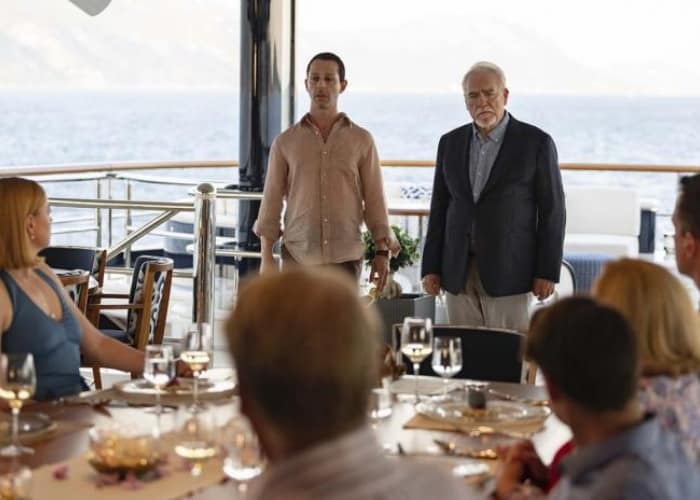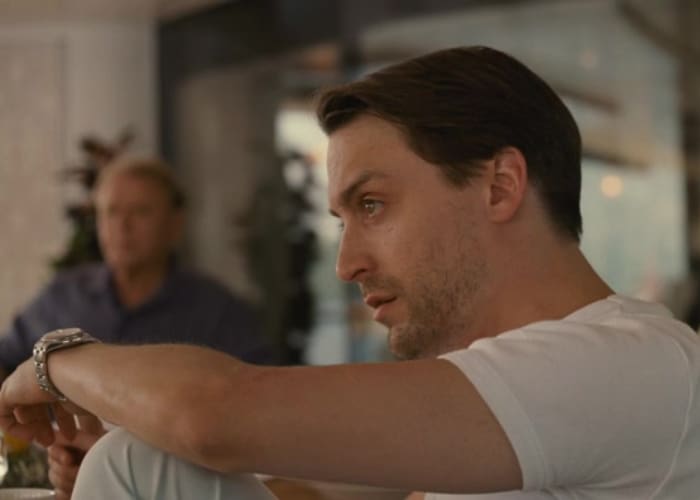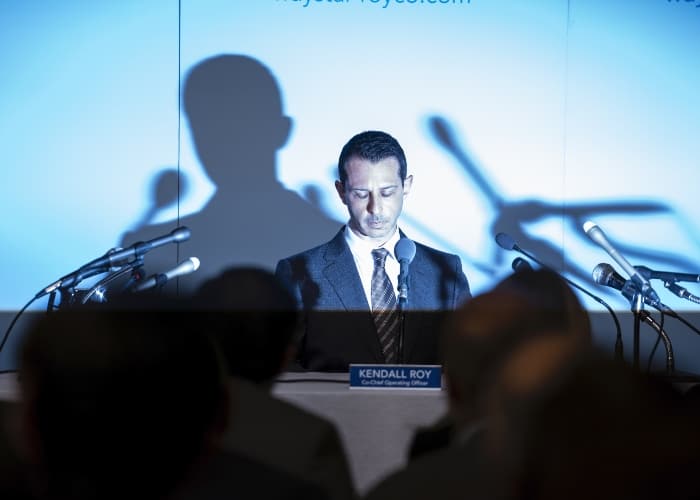
In the weeks and days leading up to the second season finale of HBO’s wealth-is-power drama Succession, the internet was alight with memes. Nicholas Britell‘s incredible, Emmy-winning theme song was synced up with everything from Bill Hader dancing on Saturday Night Live to clips from Arrested Development. One person added lyrics to the wordless theme, including the now-ubiquitous phrase “Who will get the kiss from daddy?” Another hilariously parodied the series as if it were a power struggle centered around a pack of M&Ms.
The people behind these viral moments already knew what even the most critical among us should finally accept as gospel after the last episode of Season 2, titled “This Is Not For Tears.” First, that Succession is the kind of singular character-driven drama that only comes around a few times in a decade. Second, that this series deserves to be fucking huge.
Jesse Armstrong’s darkly comic satirical drama borrows pages from all the best power playbooks: Machiavelli, Shakespeare, your college classics course syllabus, and so on. Despite many clear (and often explicitly referenced) influences, the series never feels anything less than thrillingly original. Armstrong manages to meld these quintessential story structures and philosophies together, cementing them in a skewering of American wealth so thorough and well-crafted that a simple turn of fate — or turn of phrase — can leave us as breathless as a Game of Thrones beheading.
“This is Not For Tears” is, on a literal level, a lower-stakes finale than the series’ first season ending. After all, no one drowns and no spacecraft explodes this episode, which was written by Armstrong and directed by Mark Mylod. Nonetheless, there’s an air of fatality surrounding the suspiciously friendly cruise the Roy family takes ahead of their company’s almost-certain demise.
Eggshell steps give way to casually bloodthirsty negotiations, then to a sense of heart-pounding emotional claustrophobia as the noose tightens for tragic figure Kendall (Jeremy Strong). When the pieces finally come together, the crescendo of intersecting character motivations is so symphonic, so purely, bone-deep satisfying, that the episode ends up feeling bigger than anything we’ve seen from the series before.

The acting and writing here are impeccable. Entire, massive story shifts depended on our ability to decode Strong’s microexpressions and to understand the character psychologies that have been building steadily across 20 episodes. Minor honest exchanges represent huge character growth for family members like Tom (Matthew Macfadyen) and Roman (Kieran Culkin), whose practiced passivity and humor, respectively, have until now helped them feign their way through difficult situations.
Meanwhile, Logan’s (Brian Cox) episode-ending grin may seem enigmatic to those who are conditioned to expect easily digestible plot twists, but it actually asks its audience to imagine the character more simply than we ever have before. We’ve been learning the microscopic language of Succession — the insecurities and soft spots hidden behind private jet rides and screaming fits — a week at a time for two years now, and with “This Is Not For Tears,” our obsessive fluency has finally paid off.
Much has been made of the finale’s third act, which boomerangs from subtle to blatant and back again in the blink of an eye. “You’re not a killer,” Logan tells Kendall during the scene which serves as the hour’s understated climax. By his reasoning, that’s why his son would never be able to run Waystar Royco. “You have to be a killer.”
The problem is, Kendall is a killer. He might not be a ruthless businessman at heart, but all season he’s been weighed down by the knowledge that a stranger’s secret death has left blood on his hands, and that no one will ever ask him to pay for it. He skirts around the ledges of tall buildings. He makes valiant attempts to lose himself in new love affairs. He numbs himself with substances and repeats the company line until it’s mush in his mouth. And he stares, glassy-eyed, at nothing in particular, waiting for the execution that finally arrives when Logan decides to surrender him to the mercy of the US government.
But then Logan denies the only thing Kendall knows for sure about himself — that he’s a killer — and it’s as if the elder Roy has lowered his raised gun without even realizing it. Kendall tries to breach the topic of the death directly, giving Logan another chance to make his pain matter. “It’ll be good to pay,” he says, but his father again lets him off the hook, citing the callous phrase the company uses for negligible loss of human life: “NRPI. No real person involved.” The camera finds a newfound distance between the two then. Kendall, for once, looks his father in the eyes. His own eyes, usually brimming with tears, are clear. He places a somber Judas kiss on his father’s cheek.

After so many cavalier mentions of shadowy deaths aboard cruise ships, it’s impossible not to imagine while looking at the set of his defeated shoulders that Kendall could leap overboard. But it’s possible that something inside him hardens when Logan refuses to let him acknowledge the death he caused. So he takes his anger, which this season made him concave and hollow, and gives himself permission to turn it outwards, toward the man who protesters and politicians and angry relatives have recognized as the true enemy all along.
When Kendall gives his press conference, damning Waystar Royco and his own father, Logan smiles despite himself. Does he know what finally pushed his son away? Was this part of some master scheme? It’s true that Logan may have always known he’d choose Kendall to take the fall — his is pointedly the only name not bandied about during the earlier negotiations — but it’s likely a much simpler thought that drives this expression: there’s his killer, finally.
Before the Season 2 endcap, Succession was a great show that we all hoped would continue on a great trajectory. After Sunday night, Succession has a legacy. “It’s not TV, it’s HBO,” the channel’s slogan used to tell us, and this nearly flawless season of television reminds us exactly how a standout story can expand far beyond the imagined walls of its medium. There’s a tight echelon of HBO dramas that have become, in our collective retrospect, untouchable in their excellence. With Succession currently firing on cylinders we didn’t even know it had, it might be time to think about widening that inner circle.
Related Topics: Brian Cox, HBO, jeremy strong, Jesse Armstrong, succession

